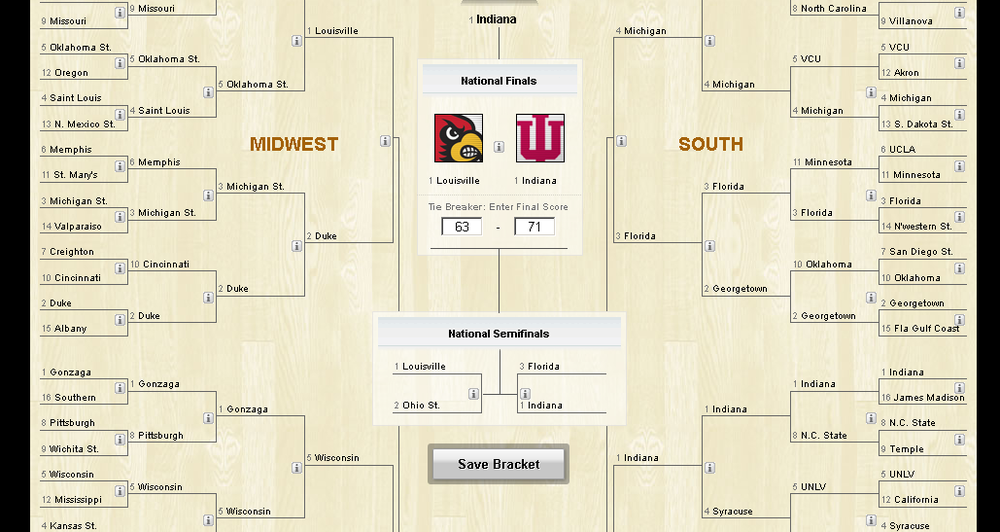Something to keep in mind while you’re filling out your NCAA Basketball Tournament brackets: While it’s mostly high stakes gamblers who catch the eye of the Internal Revenue Service, even “social” gamblers can run into troubles.
That’s advice from Jim Buttonow, who is not only a Certified Public Accountant (CPA), but also a former IRS large case team audit coordinator. After 19 years at the IRS, he left to help create a product called Beyond415 (think: “After April 15”) that helps tax professionals streamline IRS practice and procedure work with practical guidance and workflow automation.
Now, while common sense might make regular taxpayers think that $20-$100 bets wouldn’t ever get noticed, they’re probably right. Unless that person is already at a higher risk for audit, such as those filing a Schedule C for a small business, especially if they paid for their brackets online using a credit card or electronically from a bank account related to that business.
What are the reporting rules on gambling? Well, the IRS even has a form if you received winnings from a reputable establishment that follows the law. If you won a large amount from, say, a casino, you’d receive a Form W2-G, which would note winnings and any withheld taxes. The form is generally required on winnings of $1,200 or more, just as employers report wages they pay employees or contractors.
But what about the kind of gambling that most Americans don’t even think about that much? March Madness? Surely the office pool can’t get you in trouble, right? Wrong, says Buttonow.
“While most office pools are small amounts, the amount of cash won is required to be reported as income,” he said. “While my guess is that most are never reported, if you have higher winnings and are subject to an IRS examination [aka: audit], the IRS auditors will often perform a bank deposit analysis and question any unreported income. If there is more than $10,000 unaccounted for, the IRS will make an adjustment to the tax return for the ‘inference’ of income.”
In other words, the IRS will assume you didn’t earn the money in a legal way, and will adjust your return to reflect that. And we all know what the effects of assuming are: “It makes an … out of you and me.” They will also likely report you to federal and state investigators for potential charges of illegal gambling.
Perhaps I should have posted this as a blog or opinion piece, because I’m about to offer my own personal advice, which I can do, since I’m not a CPA or tax professional: The more you lie, exaggerate or have undocumented claims on your taxes, the more you have to worry about. If it’s a few bucks, even a few tens of bucks, you probably won’t have a problem. But if there’s a comma in the number, you should stay as precise as possible, and keep the records to prove it.
Buttonow, the CPA and former IRS audit coordinator, played it a little safer in his response: “I would not know as the only pool I ever see is the dunking pool at charity events – I am usually the one dunked.”
For those who do report their gambling winnings, there is good news. If you itemize your deductions, you can deduct your losses from gambling. But… only up to the amount that you won. That means, even if you lost more than you won from any combined lawful gambling events, you can only claim a deduction of up to the total of your winnings. But you’d better keep good records.
As a very innocent example, let’s say you:
- Won $2,000 at a casino in one event and they issued a W2-G.
- Lost $4,500 over the course of a year at that same #$*! casino.
- Lost $300 betting in an office pool, such as the NCAA Tourney or Fantasy Football.
In this case, there would be proven wins of $2,000. But unless you kept really good records of the losses at the casino, you wouldn’t have proof of anything, and in the best case, with records proving every penny of your $4,500 in losses, you’d still only be able to deduct $2,000 – the amount of winnings.
And that three hundred bucks lost at the office? That was basically a gift, and potentially a local crime.
The most important advice from Buttonow: Record all of your income.
“If you are in a high-stakes ‘legal’ pool, you will get a Form W-2G if the winnings are significant. However, if you are betting with a ‘bookie,’ chances are that no information statements will be issued. I don’t think Al Capone got a Form 1099.”
Remember how the government finally nailed Capone? Tax evasion.
Your best bet? Have a professional prepare your taxes.
Thanks for reading CPA Practice Advisor!
Subscribe Already registered? Log In
Need more information? Read the FAQs
Tags: Income Taxes




